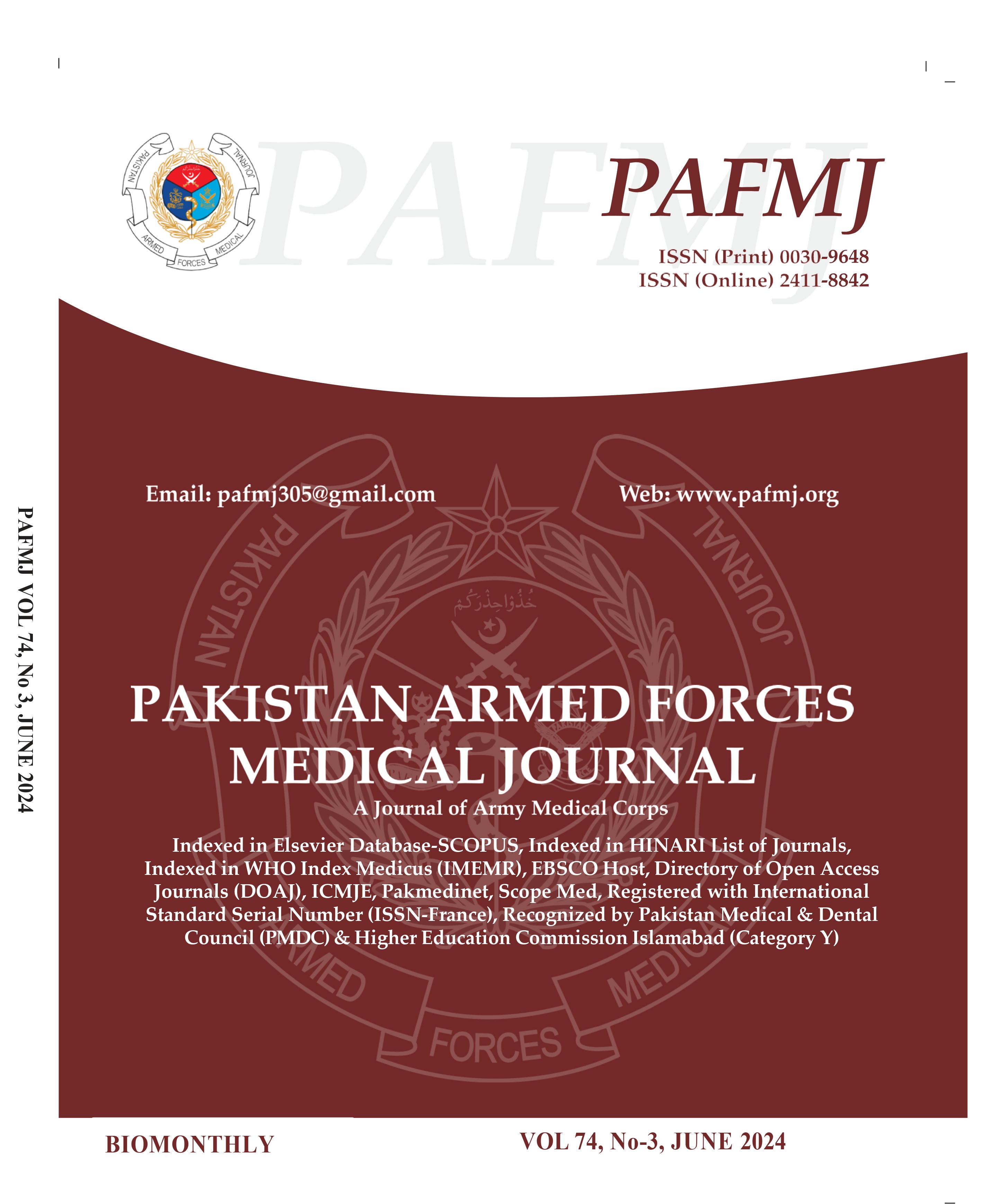Comparison of SARS-COV-2 Infection Between Sero Positive and Sero Negative Healthcare Workers After Six Months in a Tertiary Care Hospital
DOI:
https://doi.org/10.51253/pafmj.v74i3.6425Keywords:
COVID-19, Healthcare workers, SARS-CoV-2 Ab, Sero-negative, Sero-positive.Abstract
Objective: To compare the frequency of SARS- CoV-2 infection between Sero-positive and Sero-negative healthcare workersafter 6 months in a tertiary care hospital.
Study Design: Prospective Cohort study.
Place and Duration of Study: Combined Military Hospital, Kohat Pakistan, from Aug 2020 to Jan 2021.
Methodology: Two Hundred and eighty-eight healthcare workers were included by non-probability consecutive sampling. They were divided into two groups according to SARS-CoV-2 IgG-Ab status at baseline as sero-positive and sero-negative. They were followed for six months period and symptomatic healthcare workers were tested for SARS- CoV-2 infection by RT PCR. Individuals from all departments were included and used standard personal protective equipment.
Results: Out of 288 Healthcare workers 240(83.33%) were male and 48(16.67%) were female. At baseline, 42(14.58%) individuals were sero-positive and 246(85.42%) were sero-negative for SARS-CoV-2 Ab. During 6 months of follow up 28(11.38%) symptomatic sero-negative Health Care Workers were tested positive for COVID-19 infection by RT PCR. None of the sero-positive Health Care Workers was tested positive for SARS-CoV-2 infection. Risk of infection was higher in sero-negative group (Odds ratio 1.19 with 95% CI; 1.13- 1.26).
Conclusion: SARS-CoV-2Ab may offer immunity againstCOVID-19 infection as no infection was observed in sero-positive individuals as compared to 11.2% in sero-negative individuals.
Downloads
References
Zhu N, Zhang D, Wang W, Li X, Yang B, Song J, et al. A Novel Coronavirus from Patients with Pneumonia in China, 2019. N Engl J Med 2020; 382(8): 727-733.
https://doi.org/10.1056/NEJMoa2001017
Lumley SF, O'Donnell D, Stoesser NE, Matthews PC, Howarth A, Hatch SB, et al. Antibody Status and Incidence of SARS-CoV-2 Infection in Health Care Workers. N Engl J Med 2021; 384(6): 533-540.
https://doi.org/10.1056/NEJMoa2034545
Robbiani DF, Gaebler C, Muecksch F, Lorenzi JCC, Wang Z, Cho A, et al. Convergent antibody responses to SARS-CoV-2 in convalescent individuals. Nature 2020; 584(7821): 437-442.
https://doi.org/10.1038/s41586-020-2456-9
Gudbjartsson DF, Norddahl GL, Melsted P, Gunnarsdottir K, Holm H, Eythorsson E, et al. Humoral Immune Response to SARS-CoV-2 in Iceland. N Engl J Med 2020; 383(18): 1724-1734.
https://doi.org/10.1056/NEJMoa2026116
Petherick A. Developing antibody tests for SARS-CoV-2. Lancet 2020; 395(10230): 1101-1102.
https://doi.org/10.1016/S0140-6736(20)30788-1
To KK, Tsang OT, Leung WS, Tam AR, Wu TC, Lung DC, et al. Temporal profiles of viral load in posterior oropharyngeal saliva samples and serum antibody responses during infection by SARS-CoV-2: an observational cohort study. Lancet Infect Dis 2020; 20(5): 565-574.
https://doi.org/10.1016/S1473-3099(20)30196-1
GeurtsvanKessel CH, Okba NMA, Igloi Z, Bogers S, Embregts CWE, Laksono BM, et al. An evaluation of COVID-19 serological assays informs future diagnostics and exposure assessment. Nat Commun 2020; 11(1): 3436.
https://doi.org/10.1038/s41467-020-17317-y
Wajnberg A, Amanat F, Firpo A, Altman DR, Bailey MJ, Mansour M, et al. Robust neutralizing antibodies to SARS-CoV-2 infection persist for months. Science 2020; 370(6521): 1227-1230.
https://doi.org/10.1126/science.abd7728
Mumoli N, Vitale J, Mazzone A. Clinical immunity in discharged medical patients with COVID-19. Int J Infect Dis 2020; 99: 229-230.
https://doi.org/10.1016/j.ijid.2020.08.057
Gousseff M, Penot P, Gallay L, Batisse D, Benech N, Bouiller K, et al. Clinical recurrences of COVID-19 symptoms after recovery: Viral relapse, reinfection or inflammatory rebound? J Infect 2020; 81(5): 816-846.
https://doi.org/10.1016/j.jinf.2020.06.073
Adams JG, Walls RM. Supporting the Health Care Workforce During the COVID-19 Global Epidemic. JAMA 2020; 323(15): 1439-1440.
https://doi.org/10.1001/jama.2020.3972
Mukherjee A, Anand T, Agarwal A, Singh H, Chatterjee P, Narayan J, et al. SARS-CoV-2 re-infection: development of an epidemiological definition from India. Epidemiol Infect 2021; 149: e82.
https://doi.org/10.1017/S0950268821000775
Tillett RL, Sevinsky JR, Hartley PD, Kerwin H, Crawford N, Gorzalski A, et al. Genomic evidence for reinfection with SARS-CoV-2: a case study. Lancet Infect Dis 2021; 21(1): 52-58.
https://doi.org/10.1016/S1473-3099(20)30764-7
National SARS-CoV-2 Serology Assay Evaluation Group. Per-formance characteristics of five immunoassays for SARS-CoV-2:
a head-to-head benchmark comparison. Lancet Infect Dis 2020; 20(12): 1390-1400.
https://doi.org/10.1016/S1473-3099(20)30634-4
Addetia A, Crawford KHD, Dingens A, Zhu H, Roychoudhury P, Huang ML, et al. Neutralizing Antibodies Correlate with Pro-tection from SARS-CoV-2 in Humans during a Fishery Vessel Outbreak with a High Attack Rate. J Clin Microbiol 2020; 58(11): e02107-2120.
https://doi.org/10.1128/JCM.02107-20
Lumley SF, Wei J, O'Donnell D, Stoesser NE, Matthews PC, Howarth A, et al. The duration, dynamics, and determinants of severe acute respiratory syndrome coronavirus 2 (SARS-CoV-2) Antibody Responses in Individual Healthcare Workers. Clin Infect Dis 2021; 73(3): e699-e709.
https://doi.org/10.1093/cid/ciaa1870
Chowdhury MA. Immune response in COVID-19: A review. J Infect Public Health 2020; 13(12): 1619-1629.
https://doi.org/10.1016/j.jiph.2020.07.003
Zhang K, Lau JY, Yang L, Ma ZG. SARS-CoV-2 reinfection in two patients who have recovered from COVID-19. Precis Clin Med 2020; 3(4): 292-293.
https://doi.org/10.1093/pcmedi/pbaa030
Seow J, Graham C, Merrick B, Acors S, Pickering S, Steel KJA, et al. Longitudinal observation and decline of neutralizing antibody responses in the three months following SARS-CoV-2 infection in humans. Nat Microbiol 2020; 5(12): 1598-1607. https://doi.org/10.1038/s41564-020-00813-8
Long QX, Tang XJ, Shi QL, Li Q, Deng HJ, Yuan J, et al. Clinical and immunological assessment of asymptomatic SARS-CoV-2 infections. Nat Med 2020; 26(8): 1200-1204.
Downloads
Published
Issue
Section
License
Copyright (c) 2024 Muhammad Anwar, Muhammad Yasir Rafiq, Tufail Ahmad, Majid Latif, Sameena Nazir, Muhammad Shaheer Jamal

This work is licensed under a Creative Commons Attribution-NonCommercial 4.0 International License.















